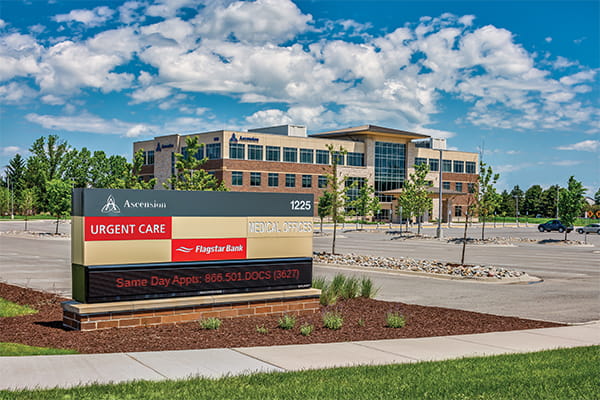
Weight-loss surgery in Detroit
Bariatric surgery helps you to lose weight by reducing the size of your stomach and changing how your body absorbs nutrients. Your appetite decreases and your stomach gets fuller with less food. Bariatric care teams at Ascension Michigan Weight Loss Program provide specialty care for surgical and medically supervised weight loss. If you are obese with a body mass index (BMI) of 35 or above, weight-loss surgery may be an option. Talk with your doctor about your answers to these questions:
- Does my current weight cause any other chronic health conditions?
- Can I commit to documented weight-loss efforts required by my insurance plan?
- Am I willing to re-evaluate my diet and exercise regimen to live a healthier life?
Weight-loss surgery can be a deeply personal, life-changing decision. Our doctors and nurses listen to understand you and your health concerns. Then, we work with you to create a weight-loss plan that’s right for you.
What to expect at a bariatric surgery consultation
Weight-loss management is a step-by-step process. At Ascension Michigan Weight Loss Program, we help guide and support you through every step of your journey. Our team of surgical weight-loss specialists includes a surgeon, obesity medicine doctor, bariatric dietitian and behavioral health support. We also have an insurance coordinator that explains insurance coverage and pre-approval requirements.
Our care team helps you to understand surgical and non-surgical treatment options and lifestyle changes. We care about your physical and emotional health. Get started on your weight-loss journey by registering for a seminar.
Types of bariatric surgery
At Ascension in Michigan, our bariatric surgeons specialize in the following procedures:
- Gastric balloon
- Gastric band
- Roux-en-Y gastric bypass
- Sleeve gastrectomy
- Revisions of previous weight-loss surgeries
We offer minimally invasive surgical options that may help shorten your recovery time. Our doctors and weight management care team are committed to helping you achieve your weight-loss goals.
Medically supervised weight-loss programs
Bariatric surgery is not your only option. Losing as little as 10-15 pounds is life changing for people living with complications from excess weight. It doesn’t matter if your goal is big or small. Our weight management care team offers consultations with a doctor who specializes in medically supervised, non-surgical weight loss. In your consultation, you will receive a full medical evaluation by a weight management specialist. You will also work with registered dietitians to help develop a personalized plan that includes your food preferences, weight-loss goals, health and lifestyle. An approved weight-loss medication may be recommended if it is safe and appropriate. Your weight management care team will meet you where you’re at and get you where you want to be. Out-of-pocket costs vary.
Weight loss before and after surgery
You will have a network of support before, during and after your weight-loss surgery. During your journey, you’ll have follow-up visits with your doctor and care team at a location near you. At Ascension Michigan Weight Loss Program, we also offer bariatric support groups, exercise and fitness programs that fit your capabilities and nutrition counseling. Your success is important to us.
Patient stories about their bariatric surgery journey
Bariatric surgery has helped many people achieve their weight-loss goals. Here are real-life success stories from patients who have followed our program.
- Ann’s weight-loss story
- Dawn’s weight-loss story
- Gary’s weight-loss story
- Heather’s weight-loss story
- Leanne’s weight-loss story
- Mary Jo’s weight-loss story
- William’s weight-loss story
MBSAQIP Accreditation
Ascension Macomb-Oakland Hospital, Ascension Providence Hospital and Ascension St. John Hospital are accredited by the American College of Surgeons Metabolic and Bariatric Surgery Accreditation and Quality Improvement Program and are also designated as Blue Distinction Centers for Bariatric Surgery.
The reason this is important is because the national medical society assessing these programs requires that hospitals meet rigorous standards of quality and patient safety. A bariatric surgery center achieves accreditation after an intense review process during which it proves it can maintain certain physical resources, human resources and standards of practice.
All accredited centers report their outcomes to the database of the Metabolic and Bariatric Surgery Accreditation and Quality Improvement Program (MBSAQIP). MBSAQIP combines the exceptional standards of the American College of Surgeons and the American Society for Metabolic and Bariatric Surgery into a unified process to create one national accreditation standard for bariatric surgery centers.
For more information, go to https://www.facs.org/quality-programs/mbsaqip or https://asmbs.org.
Weight-loss results may vary depending on the individual. There is no guarantee of specific results.
Featured Locations


